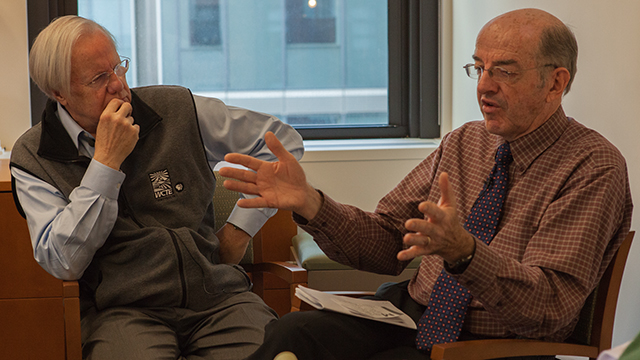
Former FCC Commissioner Michael Copps discusses the upcoming FCC vote to relax media consolidation laws with Bill Moyers. (photo credit: Dale Robbins)
This week, we’re focusing on the Federal Communications Commission’s proposal to relax the rules that prevent one company from owning radio stations, television stations and newspapers all in the same city — a move activists say would hurt diversity and be a boon for the Rupert Murdochs of the world.
It’s déjà vu for Michael Copps, who served on the commission from 2001-2011 and was acting chairman from January to June 2009 — a tenure marked by his concern for diversity and opposition to media consolidation. Copps is now the senior advisor for media and democracy reform at Common Cause. He stopped by our office Monday to share his concerns about the FCC’s latest proposal.
Bill Moyers: After all the conversations we’ve had over the years, why are we still talking about media concentration today?

Former FCC Commissioner Michael Copps. (Photo credit: Robin Holland)
Michael Copps: Because media concentration is still very much a reality today. If you opened up the papers last week, you’ll see Rupert Murdoch is maybe thinking about buying the Los Angeles Times or the Chicago Tribune. Every time you have one of these consolidation transactions, they look around for all of these wonderful economies and efficiencies that they’re supposed to harvest from becoming big conglomerates. The first thing they think is, “How do we impress Wall Street now? Where do we cut?” And the first place they cut is the newsroom. We’ve had, across this country, hundreds of newsrooms shuttered, thousands of reporters who are walking the streets in search of a job, rather than walking the beats in search of stories. And the consequence of that is, I think, a dramatically dumbed down civic dialogue that is probably — and I don’t think I’m exaggerating — insufficient to sustain self-government as we would like to have it.
There’s this wonderful story about Bill Paley, who I never knew, but —
Moyers: — founder and chairman of the board of CBS —
Copps: Right. Getting his news folks together back in the ’50s or ’60s, whenever it was, and saying, “I want you folks to go out and get the news. And don’t worry where the money’s coming from. I got Jack Benny. He’ll provide the money and you go get the news.” Can you imagine any of the current CEOs of the media companies here, Les Moonves or anybody like that, telling their news people, “You just go and get the news and don’t worry where the money’s coming from”?
Moyers: The argument we hear in rebuttal is “Well look, we don’t have to worry about monopoly today, we don’t have to worry about cartels today, because we have the Internet, which is the most democratic source of opinion, expression and free speech that’s available to us. You and Moyers are outdated because of your concerns about broadcasting and newspapers and all of this.”
Copps: I don’t buy that argument at all. The Internet has the potential for all of that. The Internet has the potential for a new town square of democracy, paved with broadband bricks. But it’s very, very far from being the reality. The reality is — and you don’t have to really look too closely — throughout history, we’ve seen every means of communication go down this road toward more and more consolidation. Wouldn’t it be a tragedy if you took this potential of this open and dynamic technology, capable of addressing just about every problem that the country has — no problem that we have doesn’t have a broadband component to its solution somewhere along the line — and let the biggest invention since the printing press probably as communication goes, morph into a cable-ized Internet? That’s what I think is happening. Most of the news generated on the Internet, is still coming from the newspaper newsroom, or the TV newsroom. It’s just there’s so damn much less of it because of the consolidation that we’ve been through, because of the downsizing, and because of a government that has been absent without leave from its public interest responsibilities for many, many years — a better part of a generation now.
Moyers: You came to the commission advocating more ownership, more diversity, more participation by minorities and women — where does that stand now? Have they made gains?
Copps: It stands pretty much where it stood when the new commissioner came through the door in 2009. We have pending before the commission dozens and dozens of recommendations to incentivize minority and female ownership. It can’t right now be truly a race-conscious policy — I hope it will be some day — because we don’t have the legal justification, and that’s due to the FCC’s not doing its homework. But they have something called overcoming disadvantage, sort of like the University of Texas and all that, where you can take into consideration a number criteria, and one of those would be minority status.
I wrote a piece on Benton’s blog that came out today, and I go back and quote from Barack Obama in previous years. This is Barack Obama at an FCC hearing, he submitted this statement, 2007, September 20th: “I believe that the nation’s media ownership rules remain necessary and are critical to the public interest. We should be doing much more to encourage diversity in the ownership of broadcast media, promote the development of new media outlets for expression of diverse viewpoints, and establish greater clarity in public interest obligations of broadcasters occupying the nation’s spectrum.” Seven months later, in February, he and Dick Durbin wrote the commission: “The broadcast ownership rules directly implicate core American values such as diversity, localism, representation and a competitive marketplace of ideas.” And listen to this: “I object”— this is Obama, as candidate, October 22, 2007: “I object to the agency moving forward to allow greater consolidation in the media market without first fully understanding how that would limit opportunities for minority, small business and women-owned firms.”
Moyers: But, to the contrary, we hear these reports that the man President Obama put on the commission as the chairman is considering further relaxation of the rules prohibiting concentration. How do you explain that?
Copps: Well, first of all, they definitely are considering it. Nobody has seen the document yet except the commissioners, but in point of fact, they are going to liberalize — that’s the wrong term — they’re going to loosen the newspaper/broadcast cross-ownership [rules] and loosen the constraints on radio and TV stations owning each other.
How do you explain that? I don’t know if it’s a question of less interest than there should be in the media issues, because people maybe deem them to be an older issue, and let’s talk about new media and wireless and spectrum and all of that. And all of that is important, but here’s my take. You know, you really have to get people away from this idea of thinking old media versus new media. We have in this country one media ecosystem, and it is partly composed of traditional media — newspapers, radio, television, cable. It’s partly composed of new media — broadband and the Internet. And it’s going to stay that way, for years yet. I mean there’ll be evolution, but we’re going to have both of these things to contend with. And neither one of them is operating, at either extreme, where they should. The traditional media is a shell of its former self, as I talked about before, really as hollowed out as Midwestern steel mill, a rust belt steel mill. But the new media — there’s wonderful entrepreneurship and experimentation taking place in the new media, but there’s no business plan to support expensive investigative journalism. How does a little website run by one or two people, how does somebody say, “Well, you take off six or eight months and go dig out this story in the state capital, would you please?” Or, “Go look at this insurance company and how it’s operating,” or the city council. You don’t get that anymore. You just wonder how many stories are going untold, how many of the powerful are being held completely unaccountable for what they did.
So the new media, for all the good things it has done — and it has done a lot of cool things, with the instant pictures and instant stories and the Arab Spring and all that stuff, but it hasn’t replaced what we’ve lost in traditional media, from the standpoint of serious and sustained investigative accountability, hold-the-powerful-accountable journalism. Until we address both parts of that equation, we will not have a media system that is worthy of the government.
You can go back to the beginnings of our country and find the founding fathers were vitally interested in our news and information ecosystem, or infrastructure, whatever they called it. So important that they subsidized postal roads, subsidized post offices. They said “Let all the newspapers in the country get out. We’ve got this daring new experiment in self-government. We don’t know if it can work or not. Maybe it will, maybe it won’t, but the only way it will work is if citizens have information so they can vote and be a part of self-government.” Fast forward to the beginning of the broadcast era. I think that was the same kind of mentality then. We’ve got this public resource here. It can help the news and information infrastructure, so if we’re going to license broadcasters to use this spectrum, we can expect them to serve the public interest in return. I think broadcasters took that seriously for a while, until they discovered, 20 or 30 years later, that the FCC wasn’t really serious about it in the first place. Now that’s all gone, from inattention, and also from the fact that FCC, beginning in the late ’70s and coming up with a vengeance after Ronald Reagan, eviscerated all the public interest guidelines that we used to have.
Moyers: On this particular decision now under consideration, the relaxation of some rules prohibiting further concentration, what can ordinary people do?
Copps: Well, they can get involved. It can become a grassroots movement. I spent 40 years in Washington, working on policy with the belief that you can do some good things from the top down, and I still believe that. But the real systemic reforms and the substantive reforms in this country, from abolition to women’s rights and civil rights, and labor rights and all that, came from the bottom up. And I think there’s enough frustration out there that it’s possible to build on that right now.

